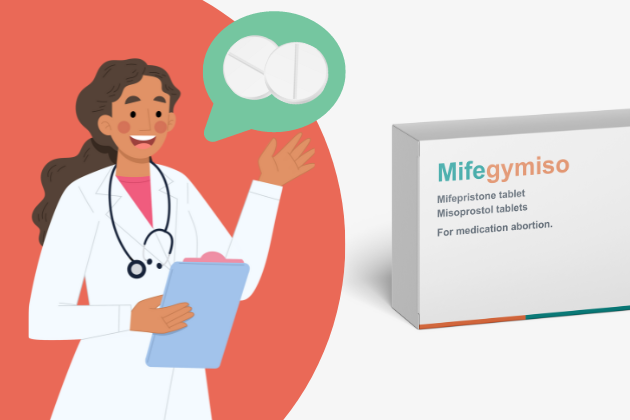
Asking a healthcare professional to prescribe medication abortion is a brave thing to do! You may feel more confident if you have all the up-to-date facts. Below you’ll find more information about medication abortion in Canada, what to do if the doctor or nurse refuses to help, and how to avoid anti-choice activity.
How does medication abortion work?
For more detailed information about the medical part of medication abortion, check out the Mifegymiso patient information guide.
Medication abortion may be suitable for you if…
- You have confirmed you are pregnant with a urine test.
- You have a regular period. This means that you bleed regularly, about every 4 – 5 weeks or so.
- Your pregnancy is under 9* weeks gestation **
Medication abortion may not be suitable for you if…
- You have a known bleeding problem.
- You are taking medication that prevents or treats blood clots.
- You are taking steroids or corticosteroids.
- You have adrenal failure.
- You have an allergy to mifepristone, misoprostol, or prostaglandins.
NOTE: If you have an IUD, it must be removed before the medication abortion can take place. Please let your healthcare provider know.
* Mifegymiso, the drug used in medication abortion, is usually used up to 9 weeks of pregnancy. In many places in the world, healthcare providers use the medication up to 11 weeks or more. This is safe and common. If your pregnancy is under 11 weeks, it is still worth asking your provider for medication abortion.
** The term gestation describes how far along the pregnancy is. Gestational age is measured in weeks, from the first day of your last period to the current date. This is a commonly used estimate because most people don’t know exactly when they became pregnant. For example:
- If your period started on January 1st and
- you took a pregnancy test on February 12th,
- you are 6 weeks pregnant (from January 1 – February 12th)
Do you have to pay for a medication abortion?
The short answer is no!
If you have Canadian health insurance, medication abortion is paid for.
Canadian health insurance means any plan from a province or territory. It also means national plans, like plans for refugees (IFHP), Indigenous peoples (NIHB), and people in the army (CFHS).
For medication abortion, you need to take your prescription to a pharmacy.
You will need a valid health card to get Mifegymiso from the pharmacy for free.
Note: If you are not in your home province, you may need to pay for the medication. For example if your health card is from Ontario, but you are getting your abortion in British Columbia, you will need to pay for the medication at the pharmacy.
You can contact our Access Line for support if:
- you have a health card, but it is expired.
- you have a health card, but you can’t access it (someone is withholding it from you).
- you do not have documentation that proves you are covered by Canadian health plan.
- you have a health card, but are not in your home province or territory.
- you do not have any form of insurance.
- the insurance you have doesn’t cover Mifegymiso.
Call 1-888-647-2725 or text 613-800-6757.
Who can prescribe medication abortion?
In Canada, by law, only some healthcare professionals can prescribe Mifegymiso. They are:
- Primary care providers
- A family doctor / physician
- General practitioner
- Nurse Practitioner
- Specialists like Obstetricians and Gynecologists (OB/GYN)
- Midwives in Quebec
In some provinces midwives and registered nurses are involved in abortion care, working together with a primary care provider who writes the prescription.
Facts about Mifegymiso in Canada
This section is up to date as of February 2024.
Mifegymiso (mi-fee-guy-mee-so) became widely available in Canada in 2017.
The rules from Health Canada about this medication have changed a few times since then, so not all health care providers may have up to date information. Here’s the latest, most up-to-date info you need:
Mifegymiso
✔ Is approved to be used up to 9 weeks gestation. Can be used safely a little later than that in the pregnancy.
✔ Can be used without first doing an ultrasound. Instead of ultrasound, blood tests and manual exams can also be used to date a pregnancy. For most people, it is enough to confirm that you’re pregnant and estimate how far along based on your last period*.
✔ Does not need to be dispensed from a doctor’s office. You only need the prescription from the doctor, nurse practitioner, or midwife. Then you take your prescription to a pharmacy.
✔ Is FREE from pharmacies. People of all ages with a valid health card can get the medication paid for (in Alberta, a proof of address is enough**).
✔ Can be prescribed by any family doctor or nurse practitioner. In Quebec, midwives can also prescribe it. If a primary care provider does not already offer medication abortion, they can start at any time. See Resources for Health Professionals.
✔ Can be offered virtually in some places. This is called “no touch”, or “low touch” abortion. You can have appointments by phone or online and get the medication from a local pharmacy. See Step 3 for a list of providers that offer telemedicine.
*According to Health Canada, an ultrasound is not required before moving forward with the abortion. However, some health care providers may feel more comfortable and ask you to have an ultrasound before you start.
In some cases, an ultrasound may be medically necessary. For example, if you have symptoms that may mean the pregnancy may not be in the uterus. Or if you’re not sure when your last period was.
Sometimes, it happens that some providers ask for ultrasounds because they think that may make some people change their mind. You are always allowed to ask the provider to explain their reasons if they ask you for an ultrasound.
**Source: Alberta Health Care Insurance Plan
Be Aware of Anti-choice Activity
Crisis Pregnancy Centres (CPCs)
There are many groups in Canada who are anti-abortion. Some have facilities that are set up as places where you can get help if you are dealing with an unplanned pregnancy. These facilities are called Crisis Pregnancy Centres (CPCs). Many of these groups are connected to religious organizations, but they might not tell you that upfront.
Because Crisis Pregnancy Centres are run by people who are anti-abortion, they try to convince people to not choose abortion. They do this by giving false, or misleading information. They may tell you about religious reasons not to choose abortion. They may also shame people, or pressure them to continue the pregnancy.
Some CPCs look like health clinics because they offer medical services such as ultrasound. Some CPCs provide programs for new parents, or baby clothes and diapers. While this can be helpful to people choosing to continue their pregnancy, it is not okay to push people to make a specific decision.
Deciding what to do about a pregnancy can be complicated. People deserve to have someone who will listen without judgement and support what they think is best. Everyone is entitled to decide their future for themselves.
Tips for avoiding CPCs
If a nurse or doctor offers you a counselling referral when you asked for abortion, they may be sending you to a Crisis Pregnancy Centre.
If you decide to check out the referral:
- Ask what services they offer before giving them your personal information.
- If you’re not getting a clear answer, ask directly if they offer abortion care on site.
- Ask if the clinic has programs for new parents (abortion providers do not).
- Ask if the clinic is tied to a local church or religious organization.
- Know who the anti-choice groups and CPCs are in your area. Check out this list of known Anti-choice groups by the Abortion Rights Coalition of Canada (ARCC).
Abortion Cannot Be Reversed
You might hear some people talk about “abortion reversal” treatments. There is no medical treatment that has been approved by Health Canada to reverse abortion. Any treatment that claims to reverse abortion is potentially dangerous to your health.
Abortion cannot be reversed. There is no medical treatment that can undo the effects of abortion pills you already took.
Once you begin a medication abortion, the process can be stopped. This means that if you change your mind, you can choose not to finish taking the medications. Please talk to your healthcare provider if this is the case.
If you are at all unsure about the abortion, there are lots of resources to support you in making the decision that is best for you.
When Healthcare Providers Deny Care
Healthcare providers are people, and they are entitled to their personal thoughts and feelings about abortion. Personal feelings or beliefs should not get in the way of providing medical care. There are rules about what doctors and nurses are expected to do if they do not want to do abortions.
Family Doctors
Doctors can refuse to provide abortion in Canada.
In Alberta, British Columbia, P.E.I, Quebec, and Saskatchewan, doctors must ensure that people are offered access to another physician, or to information. This doesn’t mean they have to provide a referral to someone who can do abortion.
In Ontario and Nova Scotia, doctors can refuse, but they are still responsible to ensure that you have access to someone else who can help you.
According to the College of Physicians and Surgeons of Ontario and the College of Physicians and Surgeons of Nova Scotia, if a doctor is not willing to give you abortion services, they must:
- Tell you that they are refusing because of personal and not medical reasons.
- Give you a timely and “effective” referral. This means they need to direct you to another doctor or clinic who provides abortion. This should not be a counselling service, or a Crisis Pregnancy Centre.
Nurse Practitioners
Nurse practitioners can refuse to provide abortion in Canada.
In British Columbia and Manitoba, nurses can refuse, but they are still responsible to ensure that you have access to someone else who can help you.
According to the British Columbia College of Nurses & Midwives, nurses must:
- Not attempt to influence or change your decision
- Work with their employer to ensure safe transfer of your care to a replacement provider
According to the College of Registered Nurses of Manitoba, nurses must:
- Make an effective referral
- Document in the client health record the request for information, and resources given to the client
Resources for Health Professionals
You may want to share resources with your healthcare provider. You can find resources for health professionals here.
This information was produced as part of the Asking for an Abortion Pocket Guide, which provides facts and tips on how to ask a healthcare professional for Mifegymiso, the drug used for medication abortions.


The views expressed herein do not necessarily represent the views of Health Canada.

